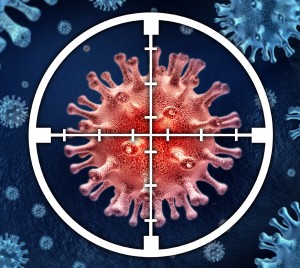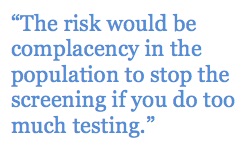Is the HPV Test the Best Way to Screen for Cervical Cancer?
 Last year, the U.S. Food and Drug Administration (FDA) approved the use of human papillomavirus DNA tests as the first line of screening for cervical cancer. On the other hand, the Pap test has served as the golden standard for the last six decades, and plenty of women are hesitant to make the switch. Which one should doctors recommend to their patients moving forward?
Last year, the U.S. Food and Drug Administration (FDA) approved the use of human papillomavirus DNA tests as the first line of screening for cervical cancer. On the other hand, the Pap test has served as the golden standard for the last six decades, and plenty of women are hesitant to make the switch. Which one should doctors recommend to their patients moving forward?
January happens to be Cervical Cancer Awareness Month, an extremely important event given that about 10,000 American women are diagnosed with the disease each year. Cervical cancer happens to be one of the most preventable types of cancer, but there are almost no discernable symptoms associated with the disease at an earlier stage. One of the primary goals of this awareness event is to educate more women about the benefits of routine screening for this illness.
Why Would the HPV Test be Better for Cervical Cancer?
So why has the HPV test been approved for cervical cancer screening? Most cases of the disease are caused by a virus known as the human papillomavirus (HPV). These sexually transmitted viruses are extremely common, affecting nearly 80 percent of Americans. One should note that not all types of HPV can cause cervical cancer.
(Looking for information about local cervical cancer clinical studies? Please click here.)
The FDA formally approved the use of HPV testing last year as a primary screening tool for cervical cancer in women ages 24 and older. The test itself requires a vaginal swabbing of the cervix just like the Pap test, so patients won’t be able to tell the difference. The new HPV test can detect 14 types of HPV, two of which are responsible for 70 percent of all cervical cancers.

Your doctor can help you decide which cervical cancer test is best for you.
The critics of the new recommendations argue that HPV screenings could lead to more unnecessary colposcopies. This can be be a stressful event for patients as it requires a visual exam of the cervix and a small biopsy. Plenty of doctors are more than comfortable with the new recommendations, but they’ll still be using the HPV test alongside or as a follow-up to the traditional Pap smear for the next few years.
The American Society for Colposcopy and Cervical Pathology and the Society of Gynecologic Oncology believes the HPV test can be just as effective on its own as the dual pronged screening technique has been over the last few years. However, they are still recommending Pap smears for women between the ages of 21 and 25, since the incidence of HPV is comparatively high in this age group.
Clinical studies have shown that the HPV test is better at detecting pre-cancerous growths and cancer than the Pap smear test. On a larger scale, this method of screening has proven to be just as effective as the Pap smear in younger women or a combined approach in patients over the age of 30.
Medical experts recommend immediate colposcopy for patients who test positive for the two most dangerous forms of HPV. Cases that come back positive for a less aggressive strain of the virus won’t require this level of immediate intervention. Those women are advised to schedule a combination screening for cervical cancer one year later.
The Rocky Landscape of Cervical Cancer Screening
“It’s an interesting time for women to try and negotiate and for clinicians to navigate the landscape of screening for cervical cancer,” explained Dr. David Cohn, chief of gynecologic oncology at Ohio State University’s Wexner Medical Center.
 For Dr. Cohn, the most compelling aspect of using the HPV test is the number of severe pre-cancerous lesions it identifies compared to the more routine Pap smear test. Several of the leading countries in the European Union have already implemented it as their primary method of screening women for cervical cancers.
For Dr. Cohn, the most compelling aspect of using the HPV test is the number of severe pre-cancerous lesions it identifies compared to the more routine Pap smear test. Several of the leading countries in the European Union have already implemented it as their primary method of screening women for cervical cancers.
Cohn and his colleagues still feel that more data needs to be collected through clinical trials, but at this time he does feel that scheduling an HPV test every three years is a sound strategy for prevention. More medical advisory groups feel that the three year interval makes sense based on accumulated oncology research studies.
Not Yet a Widely Shared Opininon
“There are several questions outstanding about this, and I think those questions need to be answered before the larger organizations go along with this recommendation,” states Dr. John Parker, of OhioHealth Obstetrics and Gynecology Physicians.
Parker is among many medical professionals who are not yet ready to endorse the switch. He says that he’ll continue to recommend Pap smears for his patients under the age of 30 and combination screenings for women who are older.
His primary objection is that HPV testing could inevitably lead to more colposcopies if women start getting regular tests in their mid twenties. Parker believes this could lead to a situation where women start ignoring positive screenings due to the number of callbacks they’ve endured in the past.
 “Colposcopy certainly is not a test that a woman wants to have done,” says Parker. “It can be parallel to callbacks for further testing for mammograms. The higher the callback rate, the less likely (women are) to come back for another screening.”
“Colposcopy certainly is not a test that a woman wants to have done,” says Parker. “It can be parallel to callbacks for further testing for mammograms. The higher the callback rate, the less likely (women are) to come back for another screening.”
“The risk would be complacency in the population to stop the screening if you do too much testing.”
Have You Been Tested Yet?
Despite the back and forth between medical experts in this field, the biggest concern is still figuring out how to get more women to come in for routine cervical cancer screenings. It’s the primary driver behind Cervical Cancer Awareness Month, but statistics show that about 50% of cervical cancer patients never underwent screening prior to their diagnosis.
According to the account of several survivors, one of the best ways to encourage more women to get screened for this disease would be to ensure that the national recommendations aren’t confusing. So hopefully these medical advisory panels can come to an agreement about the HPV test soon.